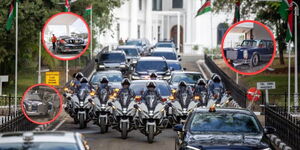Reports made rounds on Tuesday, August 9 insinuating that Kenyans in Australia were casting their ballots to elect their preferred leaders in the ongoing August 9 general election.
The earlier statistics shared by a Kenyan on Facebook had indicated that Azimio La Umoja flag bearer Raila Odinga was leading in Australia with 198 votes followed by his main competitor of Kenya Kwanza Deputy President William Ruto.
The figures caught the attention of prominent Kenyans, including political analysts in the country who re-shared the post as genuine, sparking mixed reactions.
A fact check by Kenyans.co.ke has since established that the information was false. The Independent Electoral and Boundaries Commission (IEBC) clarified that voting in the diaspora was happening in only twelve countries, and Australia was not among them.
These 12 countries are Burundi, Tanzania, Rwanda, Uganda, South Africa, and the United Kingdom (UK).
Others are Canada, USA, Qatar, the United Arab Emirates (UAE) and Germany.
The 12 recorded countries have a record number of voters with IEBC indicating that 10,443 Kenyans had registered as voters.
According to IEBC, Kenyans in the diaspora are only allowed to vote for the president. In 2017 General Election, Odinga who was vying on a NASA ticket garnered less votes compared to the outgoing President Uhuru Kenyatta of the Jubilee Party, who was then the main competitor.
With only Burundi, Tanzania, Rwanda, Uganda and South Africa having participated in the exercise, President Kenyatta garnered 1,504 votes while Odinga managed to get 1,321 votes.
Odinga was victorious in Tanzania and Burundi where he garnered 394 and 48 votes unlike his competitor who garnered 393 and 47 respectively. Kenyatta won in Uganda, South Africa and Rwanda.
While the Constitution of Kenya allows over three million Kenyans living in the diaspora, a paltry 4,000 have participated in previous polls.
Early this year, the IEBC witnessed low voter registration in many countries where Kenyans were to enlist ahead of August 9 elections, due to a range of challenges, including the pandemic and logistical issues.
As Kenyans continue to queue to elect their preferred leader from Member of County Assembly, Member of Parliament, Woman Representative, Senator, Governor and President, the exercise was marred by myriad of challenges in what could trigger voter apathy.
By mid Tuesday, August 9, IEBC had indicated that a mere 6.5 million Kenyan had cast their ballot, representing 30 per cent of 22 million total registered voters.
The low turnout could be likened to a decision by the IEBC Chairman Wafula Chebukati calling off elections in a number of areas.
The commission called off polls in in Rongai Constituency, Nakuru County over a mix up of ballot papers.
It follows an August 8 directive when Chebuati ordered gubernatorial elections in both Kakamega and Mombasa cunties to be postponed over an error on ballot papers.












